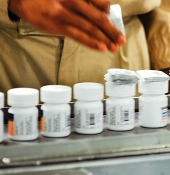 | « Back to article | Print this article |
 The operational issues between the US drug regulator and Ranbaxy Laboratories do not seem to have been limited to its Indian facilities and the term of its former promoters.
The operational issues between the US drug regulator and Ranbaxy Laboratories do not seem to have been limited to its Indian facilities and the term of its former promoters.
The company was indicted for violations at one of its US facilities in 2009, even after Daiichi Sankyo took over as majority shareholder in 2008.
In 2009, even as the company received information of contamination in some of its drug batches, it failed to give the required reports to the Food and Drugs Administration, the US regulator.
This has been alleged in a complaint for a permanent injunction, filed by the US Department of Justice and the FDA.
According to the complaint, filed in a district court at Maryland on January 25, 2012, Ranbaxy’s US subsidiary, Ohm Laboratories, failed to inform the regulator about at least two failures of drug batches within the time specified.
The relevant US law, the Food, Drugs and Cosmetics Act, requires drug manufacturers to notify FDA within three working days after receiving any information concerning a failure of distributed batches.
This notification is called a ‘field alert report’.
The FDA discovered the violations during its inspection of the Gloversville facility in 2009, one of the facilities under Ohm.
“(The) inspection revealed Ranbaxy failed to submit at least two field alert reports within three working days of receiving the information concerning a failure of one or more distributed batches of a drug to meet the specifications established for it in its drug application,” the complaint said.
Ohm got a complaint on March 23, 2009, on the presence of particles in metformin oral solution, confirmed on April 1.
“This event was not reported as a field alert report,” the complaint said.
Through investigation it was concluded that the particles could be attributed to a worn nozzle seal on the filling machine.
Again, in a separate incident, Ohm became aware of “an out-of-specification result for an antioxidant at the 24-month stability point on March 17, 2009, for sertraline hydrochloride oral concentrate”, but did not file a field alert report until March 26.
While metformin is prescribed for a certain treatment of diabetes, sertraline is used in treatment of depression.
The complaint noted that FDA, during its earlier inspection of Ranbaxy’s corporate headquarters in Princeton, New Jersey, in December 2007, had also documented similar delays in drug annual reports for medicines manufactured at the company’s